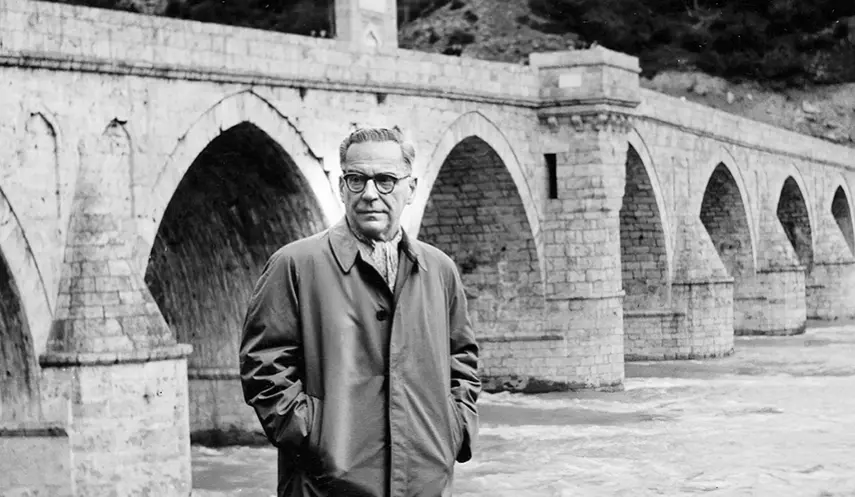IVO ANDRIĆ - PERFECT WRITER
Serbia - literature - anniversary
10/08/2025
11:26

BIJELJINA, October 8 /SRNA/ – The great Serbian writer and Nobel laureate Ivo Andrić /1892–1975/ was born on October 9, 1892.
Andrić's life alternated between literary and diplomatic phases.
In 1961, he was awarded the Nobel Prize in Literature "for the epic force with which he has shaped themes and depicted human destinies from the history of his country".
When he was young, Andrić was a member of the progressive movement Young Bosnia and a passionate fighter for the liberation of South Slavic peoples from the Austro-Hungarian monarchy.
Andrić graduated and received his doctorate in Graz, Austria, and spent the time between the two world wars serving in consulates and embassies of the Kingdom of Yugoslavia in Rome, Bucharest, Graz, Paris, Madrid, Brussels, Geneva, and Berlin.
He was a member of the Serbian Academy of Sciences and Arts.
His most famous works include: "The Bridge on the Drina", "The Travnik Chronicle", "The Damned Yard", "The Woman from Sarajevo", and "Jelena, the Woman Who Never Was", in which he primarily described life in Bosnia under Ottoman rule.
The Ivo Andrić Endowment exists in Belgrade and the first and most important provision in the Nobel laureate's will was that his legacy be preserved as a whole and used as an endowment for general cultural and humanitarian purposes.
Based on the author's will, the Andrić Prize is awarded annually for a short story or a collection of short stories written in the Serbian language.
During the German occupation of Serbia and Yugoslavia, Andrić refused to receive a pension and insisted that his works not be published.
He also refused to sign the "Appeal to the Serbian People," which condemned resistance to the occupiers.
For moral reasons, he declined a call from cultural workers to have his stories included in the Anthology of Contemporary Serbian Short Stories as "the people suffer and are in pain".
"As a Serbian storyteller, a long-time contributor to the Serbian Literary Cooperative and a member of its former Literary Board, under normal circumstances I would naturally have responded to this call. Today, that is not possible. In these exceptional times, I do not wish to, nor can I, participate in any publications, neither with new works nor with previously published ones," Andrić explained.
In the silence of a rented room on Prizrenska Street, he wrote "The Travnik Chronicle," and at the end of 1944, he completed the novel The Bridge on the Drina. Both novels were published in Belgrade a few months after the end of the war.
Andrić was buried in the Alley of Distinguished Citizens at New Cemetery in Belgrade in 1975.
As part of the Ivo Andrić Endowment, there is also a memorial museum, which is part of the Museum of the City of Belgrade, opened in 1976 in the apartment at 8, Andrićev Venac, where the writer lived with his wife Milica Babić since 1958.
At the initiative of film director Emir Kusturica, Andrićgrad, also known as Stone Town, was built in Višegrad, a cultural centre located at the mouth of the Drina and Rzav rivers, and opened on July 5, 2012.
The town is built of stone and consists of around fifty buildings, including a theatre, cinema, city hall, Academy of Fine Arts, river marina, hotels, squares, church, old inn, shops, and a memorial house of Ivo Andrić.
Ivo Andrić consistently identified as a Serb and a Serbian writer.
In a letter to the commissioner of the Serbian Literary Cooperative in 1942, he stated that he was a Serbian writer. In his personal documents - ID card, military booklet, party membership card, birth and marriage records - the "nationality" field reads "Serbian".
He twice refused to have his poems included in an Anthology of Croatian Lyric Poetry, and in 1954, he also refused to have his biography in the Yugoslav Encyclopedia mention Croat origin.
As some confirmation of his national identity, Canadian-American historian William McNeill wrote that the parents of Andrić's mother were Serbs. Additionally, Serbian writer from Dubrovnik Ivo Vojnović wrote to his brother Lujo:
"I'm sending you the work `Ex Ponto,` which has caused a great sensation. The author is a young Catholic Serb from Bosnia, an ideal young man, 26 years old."

SERBS IN TEARS AND FEAR OVER OWNERSHIP OF ORTHODOX CEMETERIES AND CHURCHES

CVIJANOVIĆ DEMANDS ACCOUNTABILITY FOR SHAMEFUL CONCERT IN ŠIROKI BRIJEG

OSTOJIĆ URGES BiH AND EU TO ACT OVER GLORIFICATION OF FASCIST IDEOLOGIES





